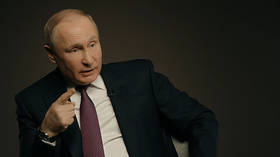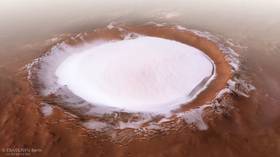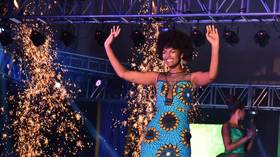‘May God bless them’: Putin says Russian protest leaders free to hold marches as long as they obey laws

There’s only one thing able to unite Russia’s notoriously divided ‘non-systemic’ opposition: hostility to Vladimir Putin and his Kremlin. Thus, they may take his faint praise for their activities with a pinch of salt.
Speaking to TASS news agency, Putin lauded the positive contribution the activists make to the life of the country. “May God bless them,” the president said. “I feel that these people are essential. After all, you do understand this is not my first day on the job. So, I believe that they are needed very much. I can tell you that they do have an impact on daily life, locally in particular, on a municipal level in major cities, and so on.”
He also noted that in any country, a certain part of society will always disagree with the government of the day. However, he advised Russian oppositionists to keep their activities within the confines of the law – otherwise, he warns, streets will burn and chaos will break out. Reiterating that “it is good that such people exist,” he mentioned there are “certain rules for everybody to adhere to, even those who like the authorities and those who do not.”
Putin also expressed his belief that history shows those who foment revolution, “as a rule, do not stay in power [for long],” with the Soviet Bolsheviks perhaps being a rare exception.
In the latest episode of the TASS project ‘20 Questions to Vladimir Putin’, the president was repeatedly confronted by the host, who tried to probe him by asking why the authorities “prefer to communicate with vocal members of society by using batons.”
Also on rt.com Opposition activists flock to central Moscow to commemorate slain politician Nemtsov and condemn constitution amendments“That is not true,” Putin replied, insisting that “vocal members of society” doesn’t necessarily mean “the so-called non-systemic opposition that [often] break the existing laws.”
Across Russia, there are also millions of volunteers and young proactive people who bring fresh blood into education, healthcare, and environmental protection, he argued. “They are very active in helping others... You know, I sometimes look at them in awe, with tears in my eyes, because these people do a really great job,” Putin explained.
The ‘non-systemic opposition’ colloquially refers to Russian political parties and movements opposing the sitting government that do not have representation in the corridors of power. Currently without parliamentary seats, they tend to voice their anger during rallies in Moscow and major cities, frequently without proper authorization. Their support is largely based in the capital, with protest attendances suggesting they have a core following of 10 to 20 thousand people. However, in certain situations, they are capable of attracting more substantial support.
Most of the movement’s most prominent figures are Western-leaning, and they are heavily promoted by American and British media and NGOs. Which means they are often better known in the West than at home. The most prominent protest leaders these days come from a wide variety of ideologies: Aleksey Navalny is a populist nationalist, Mikhail Svetov espouses libertarian beliefs, and Ilya Yashin holds strongly liberal views.
Putin is critical of some of their methods, saying everyone should enjoy the freedom of assembly, but doing so in a legitimate manner is imperative. “You want to express your viewpoint, your opinion, and you want to do it through public protest?” the president asked, adding, “you are welcome to do so. The law permits it. Get permission and go ahead.”
Also on rt.com Over 130 detained in Moscow after protesters break off from peaceful rally to walk the streetsThe protest leaders claim that because barriers have been erected to their participation in the political system, they have no option but to take to the streets. Navalny, for instance, repeatedly tried to register a party but met refusals many times. However, some high-profile analysts, such as Gleb Pavlovsky, believe their marches are counter-productive and play into the Kremlin’s hands.
Last summer, opposition activists clashed with police during a string of rallies that broke out ahead of Moscow’s city council election. The election commission refused to register a number of independent candidates citing signature collection fraud. In turn, the rejected contenders insisted the authorities had treated them differently to others, citing the ease with which the Communists of Russia party’s contestants were cleared to run.
Some of the protests proceeded without incident, while others were knowingly convened without permission from authorities. In the subsequent fallout, numerous activists faced charges for unlawfully resisting police, but most of them were dropped.
Putin, nevertheless, defended the way police handled matters, saying: “If there is no response, arson is bound to occur. Shop windows will be smashed to pieces and people will be harmed.”
Western media, and protest leaders themselves, lamented the police response, describing it as disproportionate, but taking to the streets without authorization is a criminal offense all over Europe, the president argued. “The prison terms are not very long, from 6-12 months. Yet, in some places, like Sweden, I think, for just joining unauthorized protests involving say 12 people, this is counted as mass unrest, he said. “As such deeds are punishable by incarceration, rioters would get 5-10 years behind bars,” he stressed. “We don’t have anything like this.”
Also on rt.com 20,000 gather for post-election anti-govt protest in MoscowThink your friends would be interested? Share this story!














